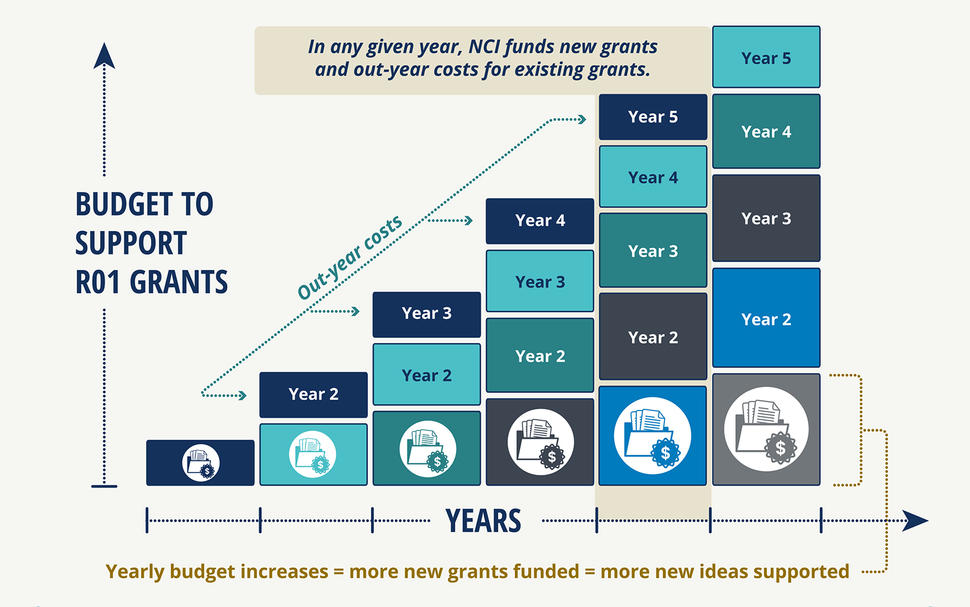A Bold Request for Cancer Research: NCI’s Fiscal Year 2024 Annual Plan and Budget Proposal
, by NCI Acting Director, Center for Research Strategy, Dr. Diane Palmieri
NCI’s Annual Plan and Budget Proposal for Fiscal Year 2024 highlights how we will make further progress against cancer and achieve the goal of ending cancer as we know it today, for all. In this edition, Dr. Diane Palmieri spotlights one of the four scientific opportunities in the annual plan and discusses NCI’s goal to increase the R01 payline to support more meritorious cancer research.
Despite the turmoil and uncertainty we’ve all endured during the COVID-19 pandemic, the cancer research community persevered and sustained their research momentum. Likewise, throughout the pandemic, NCI continued to lead, conduct, and support the cancer research needed to fulfill its mission to help all people live longer, healthier lives.
One encouraging sign during this otherwise turbulent time is the fierce enthusiasm of the cancer research community, as evidenced by the large number of new grant applications that NCI continues to receive. The research ideas proposed in these applications amply demonstrate that we are a community committed to sustaining progress and capitalizing on scientific opportunities, with relentless determination to end cancer as we know it, for all.
In September, NCI released its Annual Plan and Budget Proposal for Fiscal Year (FY) 2024. The annual plan presents NCI’s vision for making further progress against cancer through initiatives such as the Cancer Moonshot and by supporting other research across the breadth of NCI’s comprehensive research portfolio.
The annual plan identifies the resources needed to ensure that the cancer research enterprise remains strong, delivers on the many opportunities before us, and forever changes what it means to have cancer. It also outlines important areas of research that, if funded with additional resources, will catalyze further progress. The FY 2024 annual plan highlights
- advancing multi-cancer detection tests,
- expanding cell therapy as a treatment for cancer,
- overcoming the cancer-related impacts of persistent poverty and cancer disparities, and
- capitalizing on progress made in developing therapies to attack cancer-driving proteins previously considered to be “undruggable” cancer targets.
I’d like to spotlight one of these opportunities: undruggable targets. During the past decade, NCI-funded researchers developed new strategies to tackle difficult-to-target cancer drivers. These strategies have been aided by advances in several fields, including medicinal chemistry and computational biology, coupled with a deeper understanding of cancer biology made possible by other technology advances.
We chose to highlight this area of opportunity because we are approaching a point where, with sustained investment, we can virtually abandon the concept of “undruggable” targets for proteins that promote tumors (oncoproteins). However, more work remains to successfully target proteins that inhibit tumors (tumor suppressor proteins). Yet, researchers have demonstrated the ability to target proteins whose increased activities in tumors result from the decreased activity of a tumor suppressor protein.
The success of this approach, which resulted from NCI’s longstanding commitment to improve the outlook for patients with cancer, can be seen in Justin’s story. Justin is a patient with von Hippel-Lindau (VHL) syndrome, whose life changed dramatically when he enrolled in a phase 2 trial of the targeted therapy belzutifan (Welireg) at the NIH Clinical Center.
As Justin’s story explains, people with VHL syndrome often undergo multiple surgeries throughout adulthood to remove tumors that can impede organ function or increase the risk of metastatic spread.
In the early 1990s, NCI intramural researchers identified the VHL gene, a tumor suppressor that has reduced activity in the tumors of patients with VHL syndrome. This breakthrough, coupled with the innovative work of NCI-supported extramural grantees—two of whom received the Nobel Prize in Medicine in 2019—paved the way to develop a targeted therapy for this disease. Although we have not yet achieved direct targeting of VHL, the decades of research to understand the biology of the formation of VHL-mediated tumors led to the Food and Drug Administration’s approval in August 2021 of belzutifan to treat several types of VHL-associated tumors. Belzutifan inhibits a critical component in VHL-mediated tumor formation (hypoxia-inducible factor 2alpha), rather than VHL itself, and it delivers significant benefits for people who suffer from this syndrome.
The story of VHL discovery and the path to developing a treatment is an example of investigator-initiated research that drives scientific innovation. That’s why NCI is committed to achieving a grant payline to support as many meritorious investigator-initiated research grants (R01s) as possible.
Each fiscal year, NCI establishes paylines for competing grant applications, setting different paylines for different grant mechanisms (R01s, R21s, etc.). When applying a payline to the applications NCI receives, NCI awards funding to nearly all grant applications with peer-review scores better than or equal to the payline NCI establishes.
A few years ago, NCI set out to increase the R01 payline by one percentile a year, with the goal of reaching the 15th percentile by FY 2025. We labeled this goal, “15-by-25.” With a proposed $9.988 billion budget, NCI’s FY 2024 Annual Plan and Budget Proposal is a bold budget request to advance toward achieving the 15-by-25 goal and support other essential priorities.
The FY 2024 annual plan stresses the need for robust and sustained budget increases to reach 15-by-25. It includes an infographic to explain the budget challenges NCI faces to meet this goal.
As the infographic illustrates, when NCI funds a cohort of new R01 grant applications each year, we are making a multi-year financial commitment of up to 5 years. Therefore, to raise the payline each year and to meet NCI commitments to continuing research and vital research infrastructure, NCI needs sustained annual budget increases.
The bottom line: The cancer research community has made amazing strides to help people live longer, healthier lives. Justin’s story is one of many examples. The FY 2024 Annual Plan and Budget Proposal highlights how we will build on that progress and achieve the goal of ending cancer as we know it, for all.
We encourage you to read and share the annual plan with colleagues, friends, and others who may find it useful.

